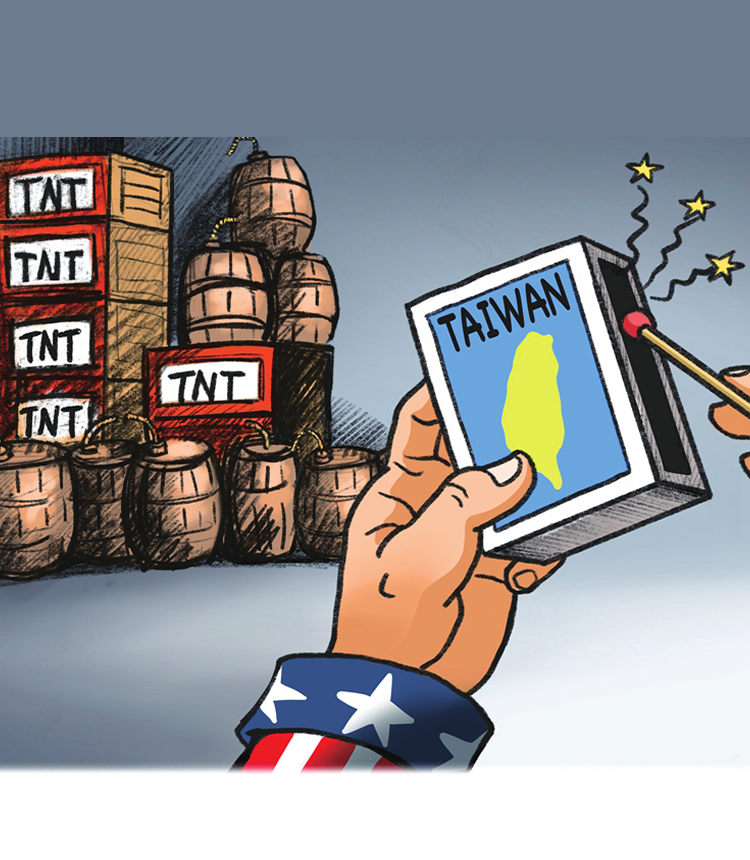
US Taiwan Illustration:Liu Rui/GT
The US Senate passed the first agreement signed under the US' Initiative on 21st-Century Trade with Taiwan island, a gesture of support for Taiwan secessionists in the name of economy and trade.
The US chambers' passage of the bill strengthening the US' ties with Taiwan authorities is damaging to China-US relations and the fragile thawing momentum brought by a string of high-level meetings recently, analysts said Wednesday, noting the US side should fully realize the dangers of its irresponsible actions.
Before the passage in the Senate on Tuesday, the US-Taiwan Initiative on 21st-Century Trade First Agreement Implementation Act passed in the House on June 21. For its last step, the bill needs US President Joe Biden's signature before taking effect.
According to the Senate Finance Committee, the legislation requires US officials to ensure that any additional agreements with Taiwan island are made transparently and in full consultation with Congress.
It also asks the US president to issue a report to the US Congress indicating he has determined that Taiwan will take the necessary measures to comply with the terms of the agreement and that the agreement will advance the interests of US workers, farmers and consumers.
On Twitter, Hsiao Bi-khim, the representative of the Taiwan island to the US and a die-hard secessionist listed by the Chinese mainland, hailed the bill's passage in the Senate as wonderful news that shows a robust trade relationship. However, citing unnamed sources, Taiwan-based media said the agreement is just a symbolic show of support from Congress.
Before and after the first part of the initiative was signed on June 1, the Chinese mainland repeatedly expressed strong dissatisfaction and firm opposition to the US' decision to reach such a so-called agreement with Taiwan island.
Congress has always been the focus of Taiwan authorities' efforts to seek a breakthrough in relations. The passage of the bill by US lawmakers has the intention of playing the Taiwan card as a counterweight to the Chinese mainland, Xin Qiang, deputy director of the Center for American Studies at Fudan University, told the Global Times on Wednesday.
Many Taiwan people can feel that the island loses out due to the trade initiative, but the Democratic Progressive Party (DPP) authorities are focused on political interests instead of economic interests, Xin added.
According to Taiwan-based media, the trade initiative does not cover tariff reductions or exemptions that the island wanted during the first stage of the agreement, but covers less important matters like customs and trade facilitation, regulatory practices, domestic regulation of services, anti-corruption practices, and small and medium-sized enterprises.
Congress passed the legislation to further implement the policy direction of the trade initiative and strengthen ties with Taiwan authorities, Diao Daming, an associate professor at Renmin University of China, told the Global Times.
Senate Finance Committee Chairman Ron Wyden described the passage of the bill as a win-win that will shore up economic ties and also make sure Congress has a voice and vote when it comes to international trade.
Analysts said that US lawmakers are using the opportunity to push for more say in external trade deals and a greater role in Taiwan-related policy.
The influence of Congress will make the Biden administration's room to maneuver China policy increasingly narrow, considering that the tone of Congress has almost become a guide for the Biden administration's action on China in the past, said Li Haidong, a professor at China Foreign Affairs University.
Given the recent string of visits to China by high-level US officials, Li said the US politicians' collusion with secessionist Taiwan authorities is damaging to the fragile thawing of China-US relations.
The channels of communication between China and the US are gradually resuming, and the two sides will certainly talk about the Taiwan question, Li said.
China would make clear to the US the danger of irresponsible collusion between the US and Taiwan secessionists, while at the same time, keeping China-US relations under control to the maximum extent, Li noted.

